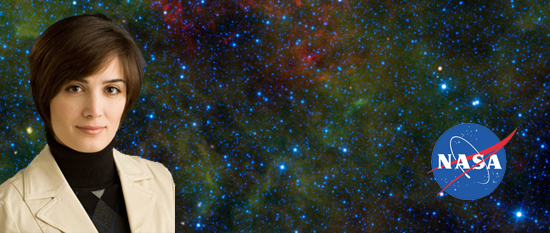Mina Rais-Zadeh receives NASA Early Career Grant to develop technology needed for picosatellites
Prof. Rais-Zadeh intends to develop a chip-scale timing unit that offers an order of magnitude higher performance compared to existing solutions.

 Enlarge
Enlarge
Prof. Mina Rais-Zadeh will pursue research into a “Chip-Scale Precision Timing Unit for PicoSatellites” as one of ten researchers selected in the inaugural year of NASA’s Space Technology Research Opportunities for Early Career Faculty. Prof. Rais-Zadeh intends to develop a chip-scale timing unit that offers an order of magnitude higher performance compared to existing solutions.
Current Quartz-based clocks are not ideally suited to the high temperatures and extreme acceleration typical of space applications. Prof. Rais-Zadeh will develop chip-scale precision clocks that will offer reduced thermal sensitivity and reduced susceptibility to shock and acceleration. Her proposed system includes an array of temperature-compensated micro-mechanical resonators with different temperature coefficient of frequencies. The resonators offer zero-bias TCF of sub-ppm levels in a broad temperature range, a high Q of more than 100,000, and a low motional impedance, all characteristics required for achieving low-phase noise and low-power clocks.
With this research, Prof. Rais-Zadeh will eliminate several risks associated with developing small-size reference clocks for picosatellites and will aid future NASA missions that require miniaturized timing units.
Prof. Rais-Zadeh is director of the Resonant MEMS Group. Her research interests include integrated RF MEMS, GaN-based micromechanical devices and sensors, MEMS-enabled ICs, wafer-level packaging and micro/nano-fabrication techniques. She is the recipient of an NSF CAREER Award (2011) and an IEEE Electron Device Society Early Career Award (2011).
 MENU
MENU 
